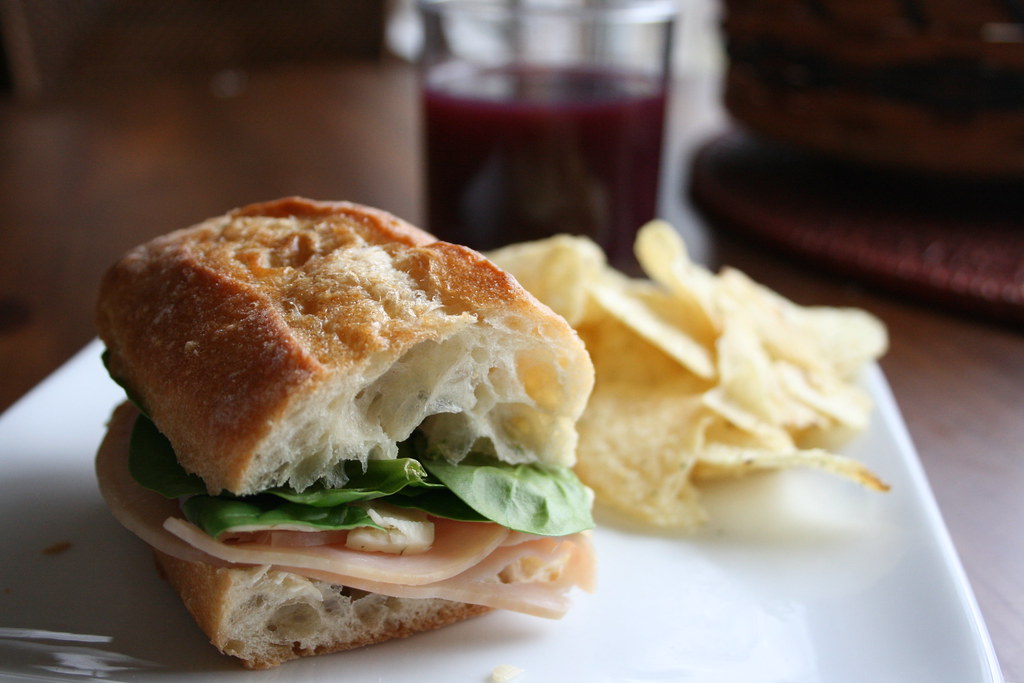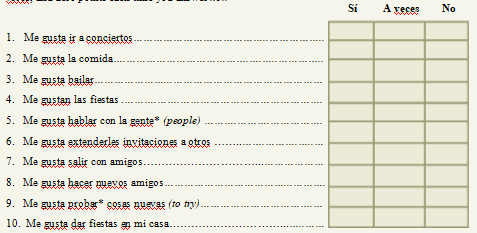4.5: The Verb Gustar
- Page ID
- 44550
We have seen gustar here and there already, and you may have noticed that it behaves a little differently than our usual verbs.
For example: To say “I like” we do not say “gusto” we say “me gusta.”
The reason for this is that what we are actually saying is: “Something” is pleasing to me.
The sentence structure is different because instead of someone doing something, something is happening to someone.
Paso 1: PICK YOUR PRONOUN

Paso 2: GUSTA - OR - GUSTAN
You will choose which form of gustar to use based on what follows it:

Paso 3: DEFINITE ARTICLE + NOUN - OR - INFINITIVE
If you use a noun, it must be accompanied by its definite article (el, la, los, or las).
If you use a verb, leave it in the infinitive. You can list as many as you like!

“AAAAA dditional information”
While you MUST USE the indirect pronouns with gustar, it’s not uncommon to also see
“Additonal information”
This is especially true for le and les, because it helps clarify who it is that you are talking about.
I call it “AAAAAdditional information” because an “a” goes in front of the extra information.
| A mí | Me |
A nosotr@s A Laura y a mí |
Nos |
| A ti | Te | A vosotr@s | Os |
|
A él A Jaime A mi hermano A ella A Leticia A mi amiga A usted |
Le |
A ellos A ellas A Spencer y a Enrique A mis amigos A mis padres |
Les |



Other notes:
To say that someone does not like something, just put no in front of the Indirect Object Pronoun (me, te, le, nos, os, les).
A Ana no le gusta el frío.
If you have a sentence with mixed pluralities, choose gusta or gustan based on what immediately follows it.
A Ana le gusta la música electrónica y las bandas de indie rock.
A Ana le gustan las bandas de indie rock y la música.
Actividad 12
PASO 1
¿Te gusta o no? Respond to the following prompts about what you like to do. Audio
1. ¿Te gusta esquiar? ________
2. ¿Te gusta ir al lago?________
3. ¿Te gusta correr?________
4. ¿Te gusta el café?________
5. ¿Te gustan las papas al horno?________
6. ¿Te gustan los perros?________
7. ¿Te gustan las galletas y el chocolate?________
PASO 2
Una conversación. Use the questions from Paso 1 to initiate a conversation with a partner.
Use the following reactions to help you continue the conversation:
AGREEING: Me too / Me neither
· A mí también—Me too (use when agreeing with a positive statement).
Me gusta la leche. ... ¡A mí también!
· A mí tampoco—Me neither (use when agreeing with a negative statement).
No me gusta la leche. ... ¡A mí tampoco!
DISAGREEING: I do / I don’t
· A mí, no—I don’t (use when disagreeing with a positive statement).
Me gusta la leche. ... ¡A mí, no!
· A mí, sí.—I do (use when disagreeing with a negative statement).
No me gusta la leche. ... ¡A mí, sí!



Actividad 13
Rellenar el espacio. Use clues in each sentence to determine which Indirect Object Pronoun is required, as well as which form of gustar is appropriate.
1. A Julia ________ ________ levantar pesas (lift weights).
2. A mi novia ________ ________ cocinar.
3. ¿A ti ________ ________ los sándwiches de pavo?
4. ¿A usted ________ ________ los gatos?
5. A Sarita y a mí ________ ________ ir al cine.
6. A ustedes ________ ________ viajar.





Actividad 14
¿Es usted un aguafiestas? Respond to the questionnaire below to determine whether or not you are a party pooper. Score two points each time you answer sí, one point each time you answer a veces, and zero points each time you answer no..
Me gusta ir a conciertos…………………………………..……………..
2. Me gusta la comida….……………………………….….…..…………..
3. Me gusta bailar…………………...………………………………………
4. Me gustan las fiestas .……….…….…………………………………….
5. Me gusta hablar con la gente* (people) ……….……….…………….
6. Me gusta extenderles invitaciones a otros ……..…….……….…..…
7. Me gusta salir con amigos…………………………...………………
8. Me gusta hacer nuevos amigos………………………………...……….
9. Me gusta probar* cosas nuevas (to try)…………………………….…
10. Me gusta dar fiestas en mi casa…………………………...…..……

Si tiene entre 15 y 20 puntos, usted es el alma de la fiesta.
Usted es una persona sociable. A usted le gusta conocer a nuevas personas y hacer nuevos amigos y, lo hace facilmente. Pero, no es tan fácil para todos. Una persona como usted puede ayudar a las personas más tímidas en una fiesta con un esfuerzo a conocerlas, a empezar conversaciones y a hacer presentaciones entre personas que tienen intereses comunes.
Si tiene entre 8 y 14 puntos, usted es una persona normal.
A usted le gustan las fiestas pero, le da igual quedarse en casa con un buen libro de vez en cuando. Usted tiene un buen equilibrio entre el tiempo que pasa en situaciones sociales y el tiempo que pasa a solas.
Si tiene entre 0 y 7 puntos, usted es un aguafiestas.
La vida es para disfrutirla. Si a usted le gusta pasar tiempo a solas, no hay problema. Pero, si usted se siente triste por nunca pasar tiempo con amigos, hay que tomar pequeños pasos para reconectarse con la vida social. Hoy es un buen día para llamar a un viejo/a amigo/a.
Este cuestionario solo sirve para entretener; no se debe interpretarlo como consejos.
This questionnaire is only for entertainment, it should not be interpreted as advice.


